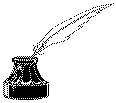

The ABC's of IRC
What's different about IRC chat, then say AOL or ICQ chat?
![]() IRC differs in the fact that it is very dynamic. Once you have connected to a server.
Your client registers your nickname with the server. Nicknames are like handles you go
by while on IRC. These handles may be limited to 8 characters on some networks, and
up to 32 on others.
IRC differs in the fact that it is very dynamic. Once you have connected to a server.
Your client registers your nickname with the server. Nicknames are like handles you go
by while on IRC. These handles may be limited to 8 characters on some networks, and
up to 32 on others.
![]() IRC can be thought of as a large house, with many, many rooms. These rooms are called "channels". Channels are prefixed by either a +, &, or most commonly a #. Each of these symbols mean different things. For example, a channel on whales would most likely be called #whales.
IRC can be thought of as a large house, with many, many rooms. These rooms are called "channels". Channels are prefixed by either a +, &, or most commonly a #. Each of these symbols mean different things. For example, a channel on whales would most likely be called #whales.
![]() Channels are run by "Operators", who are denoted by an @ sign usually. Channel operators, or "ops" have to the ability to kick, ban, and make other people operators. They can also set topics, and change modes.
Channels are run by "Operators", who are denoted by an @ sign usually. Channel operators, or "ops" have to the ability to kick, ban, and make other people operators. They can also set topics, and change modes.
![]() Topics are lines in channels that usually tell what the current conversation is about. For example, you may join the channel #whales, and find the topic to be: "Topic for #whales: New breed of White Whale found off coast of Norway set by Whaleluver". Topics always tell who they are set by.
Topics are lines in channels that usually tell what the current conversation is about. For example, you may join the channel #whales, and find the topic to be: "Topic for #whales: New breed of White Whale found off coast of Norway set by Whaleluver". Topics always tell who they are set by.
![]() Channel "preferences" or "modes" are different flags a channel has. Most comonly these are t, n, s, m, v, l, p, and k. These all stand for various things and are either set on by a + sign, or off by a - sign.
Channel "preferences" or "modes" are different flags a channel has. Most comonly these are t, n, s, m, v, l, p, and k. These all stand for various things and are either set on by a + sign, or off by a - sign.
![]() Now you know the basics about IRC, make sure you check out the IRC Primer and the clients for accessing IRC, at the Home page for IRC programs which is located at: http://www.irc.net/
Now you know the basics about IRC, make sure you check out the IRC Primer and the clients for accessing IRC, at the Home page for IRC programs which is located at: http://www.irc.net/
![]() It has several different client programs that you can download. IRC is not the only virtual chat-space you can access today.
It has several different client programs that you can download. IRC is not the only virtual chat-space you can access today.
![]() All the major providers have similar chat areas or programs that you can use. American On-Line has AOL Instant Messenger. There also is a program called ICQ, which AOL now owns also. These programs and many like it allow users to chat one on one or with groups of people.
All the major providers have similar chat areas or programs that you can use. American On-Line has AOL Instant Messenger. There also is a program called ICQ, which AOL now owns also. These programs and many like it allow users to chat one on one or with groups of people.